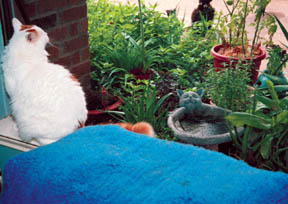Yawn! Like other preconceived notions, people often buy into the notion that indoor cats enjoy lying around the house all day doing nothing.
People generally have a stereotypical view of what a cat is like, says John Wright, PhD, a certified applied animal behaviorist and professor of psychology at Mercer University in Macon, Georgia, and author of Is Your Cat Crazy? For some cats, lying around the house may be the cats meow, but for other cats its just not tolerable. The truth is, cats differ tremendously in terms of their activity and need for stimulation, he says.
Cats may appear to be bored, much as we define the word in human terms. This occurs both emotionally and behaviorally, in that after they have rested or not been involved in any activity for a certain amount of time, cats seek out stimulating things to do, Dr. Wright notes.
A Health Check First
If your veterinarian gives your cats health a thumbs up but he seems unhappy, consider the possibility that your cat is bored. Feline signs of boredom include drawing attention to solicit play or chase (pestering you); attempting to leave a restrictive area to find a more interesting place to be (escaping through a screened window); and repetitive behavior, such as knocking over display photos or batting jewelry off a dresser.
Cats tend to become destructive when bored, especially when you pay attention to the destruction; for example, replacing items for your cat to knock over again, Dr. Wright says. Its fun for cats and releases the boredom.
This behavior is less likely to be fun for you, though. Dont try to defeat or punish your cat; instead, redirect the behavior. The idea is to try to arrange things to satisfy your cats biological and social needs – but on your terms, Dr. Wright suggests.

288
What Are Your Cats Needs?
The most important thing you can do to alleviate boredom is to pay attention to your individual cat and its behavior, he recommends. Take advantage of why cats were domesticated in the first place – to be with you and me, he says. To satisfy those anti-boredom needs, consider your cats desire to explore, play and have social affection.
Cats like to be with us, to play with us or at least play in our presence, he continues. Because we now keep cats indoors, feline activities and options are more human-centered. We essentially have a responsibility to make sure some activities are really enjoyable for them, along with giving them reasons for wanting to stay in the household, he explains.
Cats need both mental and physical challenges, which vary depending on age and personality. Younger cats will probably require more mental and physical stimulation than very old cats, while more social and outgoing cats will hunger for a little more excitement than reserved ones.
Match the activity to your own cats particular personality, Dr. Wright suggests. For example, some cats want to be hunters right before they eat; others just want to be fed. Once fed, they may choose to nap or play, he says.
When does your cat like to play? Figure out the best time of day (cats are usually early risers, but older cats may not be) and precede that time by a few minutes with something your cat enjoys, he recommends. For example, let your cat play with a toy with you, activate a toy remotely for her or allow her access to a location containing favorite items.
Above all, dont try to fit your cat into one mold, Dr. Wright advises. Dont force something if your cat isnt interested; instead, find something else he or she likes to do. As long as your cat can look forward to a few play bouts every day, youre probably not going to have a cat who suffers from boredom, he concludes.



